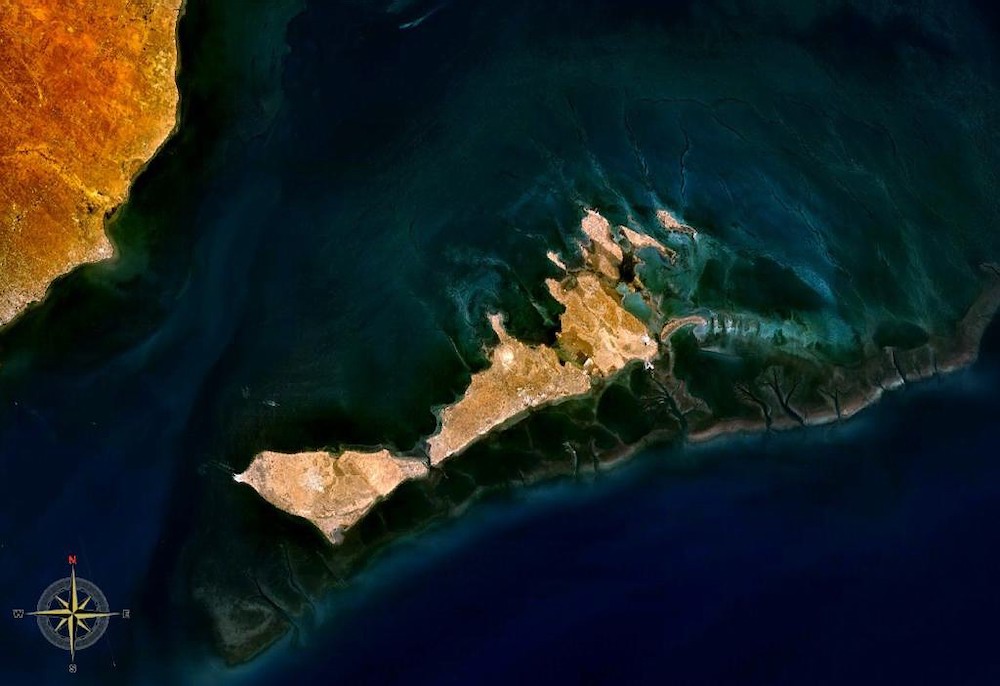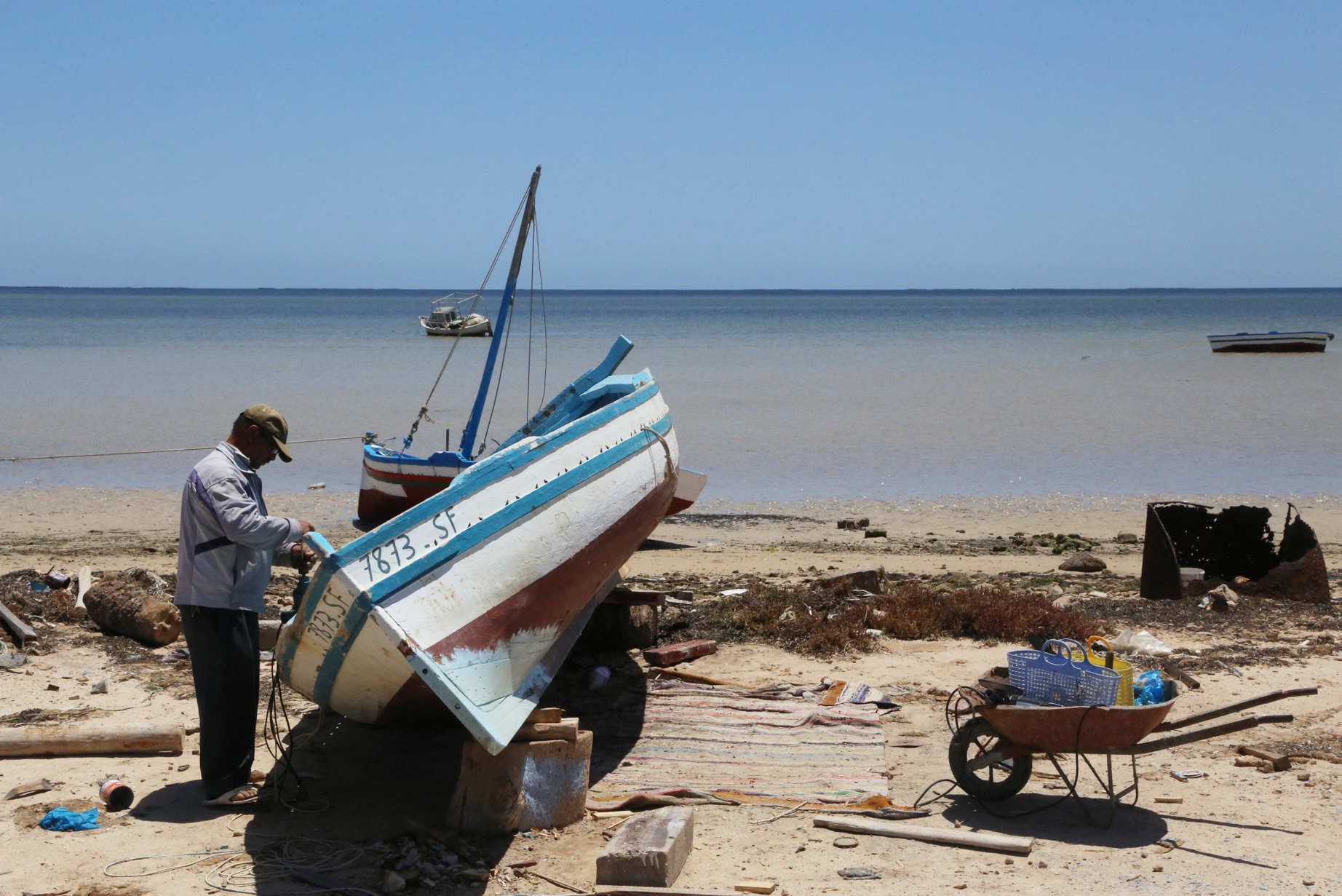The islands of Kerkennah, off the coast of Tunisia, stand to be significantly affected by rising sea levels brought on as a result of climate change. With dismal predictions regarding its increasing vulnerability in the coming decades, civil society organizations remain determined to improve the island’s adaptability and survival.
Located 17.9 kilometers from the Tunisian coast, northeast of the governorate of Sfax, the islands of Kerkennah form an archipelago in the Mediterranean Sea with a perimeter of 160 kilometers. The archipelago is composed of two main islands: Gharbi and Chergui, or Grande Kerkennah, in addition to 12 islets. Kerkennah has a population of 15,501 people, according to the 2014 Tunisian National Institute of Statistics, a number that increases significantly in the summer due to the emigrants returning from mainland Tunisia, France, or Italy.

Covered with olive trees and vines, this archipelago, which once hosted the Carthaginian general Hannibal during his exile after the Battle of Zama, is now increasingly threatened by climate change and rising sea levels.
Biodiversity in Kerkennah
The islands of Kerkennah enjoy extensive marine diversity, with fishing occupying an important place in the daily life of the inhabitants of the islands. This activity represents the economic heart of Kerkennah. Fishermen in the Kerkennah islands practice unique fishing techniques, such as “the charfia,” a technique dating back several centuries innovated to reach low-lying schools of fish one or two meters below the surface. The charfia is classified as an intangible cultural heritage by UNESCO.
Characterized by a flat relief with a maximum altitude of 13 meters, the archipelago is particularly vulnerable to rising sea levels, which would likely lead to partial, or even total, submersion underwater. Indeed, according to the Intergovernmental Panel on Climate Change synthesis report in 2019, global warming is responsible for a rise in sea levels observed since the end of the twentieth century and further anticipated in the future. Islands like Kerkennah stand to be most affected by this phenomenon, despite having scarcely contributed to global warming; the impact of rising sea levels could be significant by 2020-2050 and could potentially reach more than 50 centimeters by the end of this century, according to one scientific study.
“Several parts of the Kerkennah archipelago will disappear within a few years; the rise in sea level represents a real danger for the islands and the local population,” says Mehdi Ben Haj, vice-president of the Blue Season Association which is committed to the protection of the coast and the maritime environment in Tunisia.
This map from Climate Central illustrates the impact of rising sea levels if they reach 50 centimeters above the high tide line. In this case, significant parts of Kerkennah will disappear, having an immeasurable impact on their fauna, flora, and the local community.
Moreover, the Mediterranean is rapidly becoming the fastest warming sea, with temperatures rising 20 percent faster than the world average and sea levels expected to rise by over one meter by 2100. As a result, new species suited to warmer water temperatures have migrated into the Mediterranean Sea, threatening local species.
And for its people, life on these islands is becoming increasingly difficult, as the sea becomes less and less generous because of pollution, overexploitation of resources, as well as invasive blue crabs from Asia shrewdly-nicknamed “Daesh” due to their destructive impact on the island’s ecosystem. “They call it Daesh because it destroys everything,” says Souhail Baabaa, member of Young Sciences Kerkennah Association.
Indeed, this species has routinely destroyed the nets and equipment of fishermen and attacks fishermen when they try to remove them from nets. The wounds their hands sustain from the blue crabs often prevents them from working for days.
Survival and conservation
The only hope for Kerkennah’s islanders today is through adapting to the impacts of climate change. Several environmental associations in the islands are working to raise awareness on climate change among the local population, like the Young Science Association Kerkennah, an environmental and sustainable development education association that works with fishermen to improve their resilience in the face of climate change. Particularly, they aim to support their adaptation to the invasive blue crab. “We frequently work with fishermen, who are at the forefront of those most affected by the effects of climate change on the island. The blue crab represents a barrier for their work; it is considered their enemy, but still, we organize scientific events in order to encourage adaptation to invasive species as well as the protection of endangered species like sea turtles,” says Baabaa.
The work of civil society in Kerkennah has played a major role in the conservation of sea turtles on the islands. Fishermen today are the main actors in safeguarding these threatened species, sometimes carrying out rescue operations that they share online with members of the TunSea Association, a participatory science platform which aims to promote educational initiatives and the exchange of information on marine sciences. “Our objective via TunSea is to create an ecosystem where various actors such as scientists, fishermen, associations, young people, any citizen who loves the sea, are interconnected and gathered around a common passion. Our aim is to exchange information, strengthen cooperation, as well as educate and raise awareness in the community,” says Emna Derouiche, a member of the organization.
Between the threat of climate change and the worsening economic situation in Tunisia, Kerkennah has become very vulnerable, while the state remains silent and seemingly unprepared to save the island. Even more worryingly, the state remains powerless to protect a population attached to their land.
Adel Azouni is a PhD candidate in Environmental Geology and a geologist based in Tunis, who is passionate about environmental activism.
